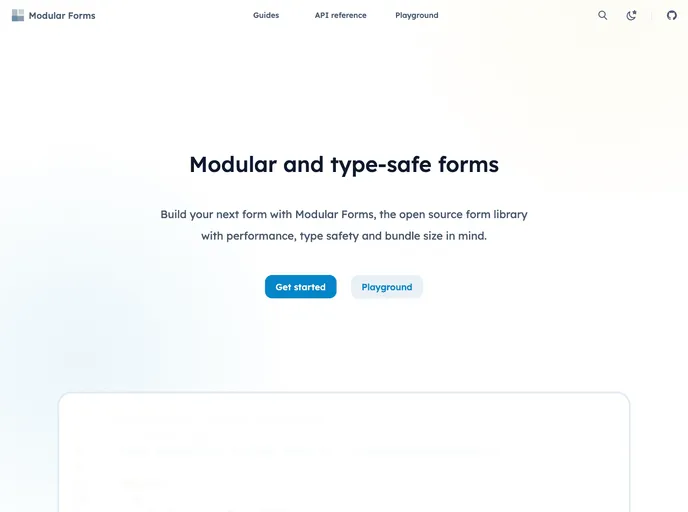Modular Forms

The modular and type-safe form library for SolidJS, Qwik and Preact
Overview:
Modular Forms is a JavaScript library designed for validating and handling various types of forms. Built on SolidJS, Qwik, Preact, and React, it emphasizes type safety, fast performance, and a small bundle size due to its modular design. The library offers features like type-safe autocompletion, support for various form fields, and a minimal, readable API.
Features:
- Small Bundle Size: Starting at 3 KB, ensuring lightweight integration.
- Fast Performance: Fine-grained DOM updates for quick responsiveness.
- Type Safety: Autocompletion in the editor for error-free coding.
- Validation Support: Validate a wide range of data from emails to files.
- Minimal API: Well thought out and easy to work with for developers.
- Progressive Enhancement: Enhance forms with actions while maintaining accessibility.
- Modular Design: Use only the necessary components, keeping dependencies at a minimum.
- Headless Integration: Define the visual aspects according to your requirements.

- Qwik
Qwik is an innovative Static Site Generator (SSG) that focuses on ultra-fast loading times by rendering pages on the server side and delivering optimized JavaScript to the client side. It leverages its unique Qwik framework to achieve rapid page rendering, making it a powerful choice for building performant static websites.
- Solid
SolidJS is a declarative JavaScript library for building user interfaces, offering a reactive programming model for efficient updates. It stands out for its reactivity system that minimizes unnecessary re-renders and its small bundle size, making it a performant choice for developing lightweight and reactive web applications.
- Typescript
TypeScript is a superset of JavaScript, providing optional static typing, classes, interfaces, and other features that help developers write more maintainable and scalable code. TypeScript's static typing system can catch errors at compile-time, making it easier to build and maintain large applications.